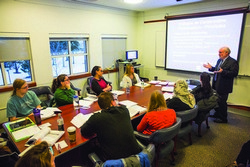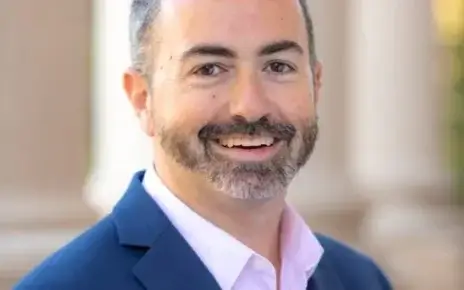Last month, The Outlook reported that Monmouth University will be reducing the 128-credit requirement for graduation to 120 credits, effective in the fall of 2020.
One of the traditionally required courses that may be getting cut due to this change is the First Year Seminar.
The First Year Seminar is a three-credit course that currently fulfills a general education requirement for all first-year students who enter the University with 18 credits or less. The requirement must be completed during the student’s first semester.
The University’s policy states, “Within the course, students have the opportunity to sharpen higher-level academic skills, enhance awareness of ethical issues in academia in general and the course topic in particular, and expand their learning through University resources, activities, and events.”
According to Marina Vujnovic, Ph.D., Chair of the Faculty Council and an associate professor of communication, First Year Seminars became a requirement for students following the University’s general education reform in 2009. Vujnovic said that a few major reasons for originally implementing the First Year Seminar were concerns with engagement and retention amongst students.
“Proponents [of the First Year Seminar] believed that allowing students to take courses outside of their primary academic interest area would allow them to learn about the transition to college while also learning about a topic or an area they otherwise might not be familiar with,” said Vujnovic. “This would allow them to adjust better to college, widen their interests, engage them more, and retain them at Monmouth.”
Judith Nye, Ph.D., Faculty Director of First Year Seminars and Associate Vice Provost of Academic Affairs for General Education, noted, “The faculty are currently in conversation about possible changes to the general education curriculum as part of Monmouth’s efforts to reduce required credits from 128 to 120, but there are several options on the table, and it would be premature for me to comment.”
“Conversations about revisiting what we do in First Year Seminars have been happening on campus before the 120-credit reduction conversation, but it got more prominent with the 120-credit discussion,” Vujnovic added.
Kenneth Campbell, Ph.D., a professor of history, teaches a First Year Seminar course on the Beatles. “It has been one of the most enjoyable and rewarding experiences of my career,” he said. “I like that the classroom atmosphere is a little more informal than other classes because part of the focus is on being a mentor and helping [the students] to adjust to college and a key transitional phase in their life.”
Campbell said, “I am adamantly opposed to those who wish to eliminate the First Year Seminar.” Through student feedback and evaluations in his course, he has seen the benefits that students are able to take away from it. “They don’t all get the same benefits, but the course is designed so that almost everyone seems to get something valuable out of it,” he added.
Eric Easterly, a senior business student, said that he had fond memories of his First Year Seminar course, “History Through Hollywood,” when he took it during his first semester at Monmouth in 2015. “It was a nice adjustment class for getting used to college,” he said.
Easterly said that in the course, students were given assignments in class that required them to explore the University and its resources. “We did a scavenger hunt that made us use the Writing Center and see everything in First Year Advising,” he recalled.
When asked what his thoughts were on the University potentially cutting the First Year Seminar requirement, Easterly said, “I don’t think that they should, I think it’s nice in your first semester to have a class where you’re taking something that you enjoy and that eases your way into adjusting for college.”
Vujnovic believes that students should be exposed to content areas outside of their majors, which is an import aspect of the University’s academic life. However, she is not sure if the way the First Year Seminars are designed right now is the only way to achieve this.
“We need to look into whether simply taking a discipline-specific course that has open seats for primarily freshmen would deliver the same thing,” said Vujnovic. “This kind of a course would potentially alleviate some concerns from the faculty that do not feel comfortable or prepared to teach the transitional part of the course as it is designed now.”
She noted that the transitional aspect of the course is already covered well by student services. However, more could be done through First Year Advising to ensure that first-year students have all the necessary amenities they need to succeed at Monmouth.
Discussions on the fate of First Year Seminars are on-going and there is currently no deadline for the University to reach a final decision. If the course requirement does end up getting cut, Vujnovic said that there would certainly be a new type of required class or activity available to incoming students that will help them learn to adjust to life at Monmouth. “It is the University’s mission and goal to help students acclimate and be a full, engaged, and happy member of our Monmouth family,” she said.
With the possibility of First Year Seminars being cut still on the table, Campbell said, “It would leave a void of a course in which [the students] are specifically encouraged to talk with their professors and PLAs (Peer Learning Assistants) about issues or problems related to the transition to college and adult life.”
PHOTO COURTESY of Monmouth University




